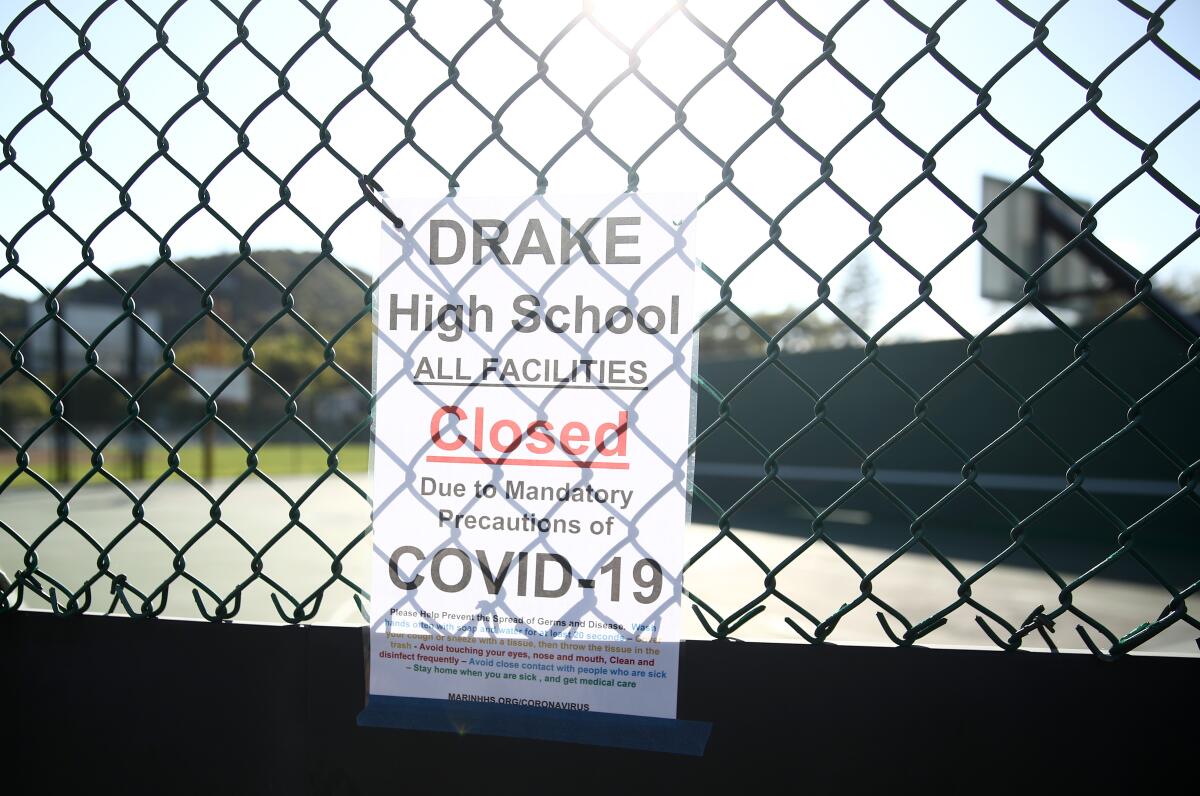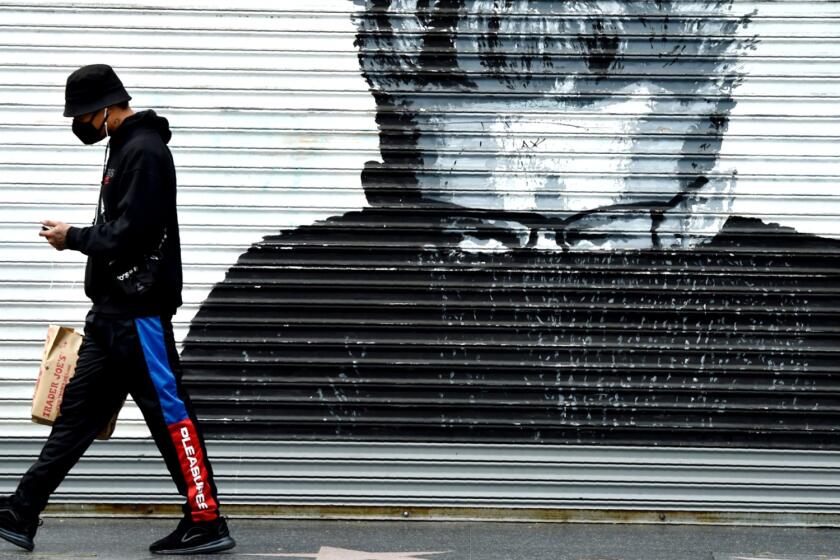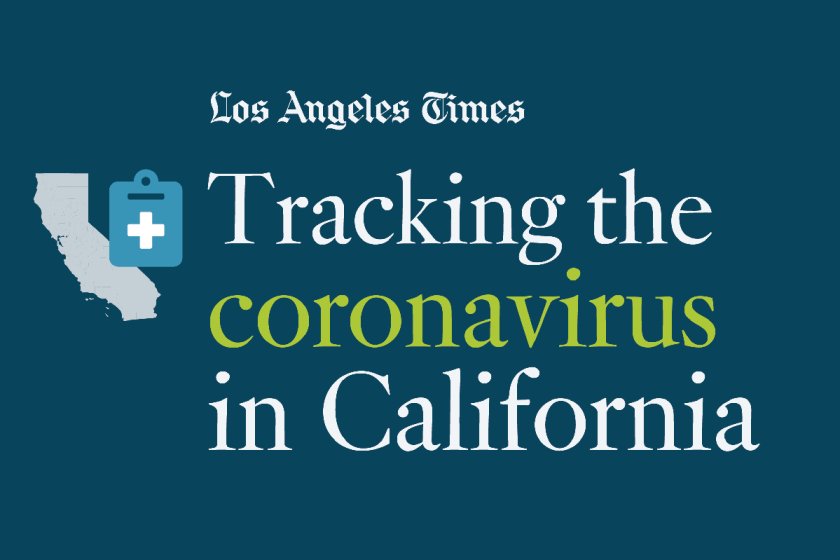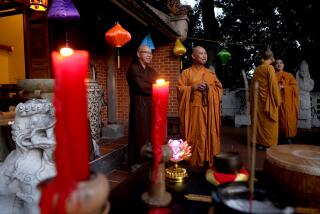As coronavirus death toll mounts, California sees life upended for weeks to come

- Share via
SACRAMENTO — With coronavirus cases and deaths spreading across California, officials were moving urgently Tuesday to slow the spread by releasing 3,500 inmates from prisons, extending stay-at-home orders and confirming schools are not likely to reopen before the end of the academic year.
The number of confirmed cases in the state topped 8,000, with more than 170 deaths. Los Angeles County officials Tuesday confirmed 10 new coronavirus-linked deaths and reported the first such fatality of a healthcare worker. The number of deaths in the county is at least 54. In Santa Rosa, police announced a well-respected detective had died from the virus.
While there are some early signs that the extreme social distancing rules across the state might be helping, officials said they will probably have to be in place for weeks to come, which will continue to take a devastating toll on the economy.
Across California, there were signs of how COVID-19 was upending life.
California is granting early release to 3,500 inmates in an effort to reduce crowding as coronavirus infections begin spreading through the state prison system.
Lawyers for Gov. Gavin Newsom on Tuesday told a panel of federal judges the state is taking “extraordinary and unprecedented protective measures” to slow the spread of the virus and protect those who live and work within California’s 35 prisons. The accelerated prison discharges come in the face of pressure to do much more.
The latest updates from our reporters in California and around the world
In court filings, state lawyers said California intends to accelerate release and parole dates for 3,500 inmates serving terms for nonviolent crimes and already due to be released within 60 days. The releases are to be conducted “within the next several weeks.”
Documents provided to The Times show state prisons have been locking down cell blocks where inmates exhibit flu-like symptoms. That has heightened fears among family members, especially of those inmates who are older or at risk of severe illness from COVID-19, the disease caused by the novel coronavirus.
As cases continue to rise, six Bay Area jurisdictions announced Tuesday that they would extend their stay-at-home orders through the beginning of May and put new restrictions on such things as residential construction projects and the number of people who can attend funerals.
The counties extending the order are San Francisco, San Mateo, Santa Clara, Alameda, Contra Costa and Marin.
Dr. Sara Cody, the Santa Clara County public health officer, said the Bay Area’s strict stay-at-home order was working, but it needs more time.
“I want to say that: The incredible sacrifice that everyone has made, I believe it is starting to bend the curve. But it’s not enough and it hasn’t been in place long enough, so we need to keep at it, we just need to keep at it,” Cody said at a briefing. “I believe it’s beginning to make a difference, and it’s giving our hospitals more time.”
Los Angeles Police Department Chief Michel Moore said Los Angeles may also extend its stay-at-home order.
Still, experts warn the epidemic could get dramatically worse. Several nursing homes and skilled nursing facilities across the state, including one San Francisco facility with more than 700 beds, are being monitored as potential hot spots of the virus.
In San Bernardino County, nearly 60 patients and staff members at a Yucaipa nursing home have tested positive for the coronavirus and two residents have died in what may be the state’s largest outbreak at a single facility, authorities said Tuesday.
While testing continues, Cedar Mountain Post Acute Rehabilitation has been told to assume that all of its patients have the COVID-19 virus, San Bernardino County Department of Public Health Director Trudy Raymundo said at a briefing.
The nursing home, which has about 90 beds, isn’t accepting new residents or discharging any, and the facility has been closed to visitors under Newsom’s 2-week-old stay-at-home order, Raymundo said.
An elected official in the Bay Area pleaded for help Tuesday, appalled by the shortage of personal protective equipment at a hospital leased by the state of California to care for coronavirus patients.
“Here’s what I see: I see a disaster on the brink of happening,” San Mateo County Supervisor David Canepa said at a meeting of the Board of Supervisors on Tuesday about the shortage of personal protective equipment, a category that includes masks, gowns and gloves, at Seton Medical Center in Daly City.
There’s also a shortage of staffing at hospitals in San Mateo County, and there were just five empty intensive care unit beds as of Tuesday, out of a total of 66 available across the county, said Louise Rogers, chief of San Mateo County Health.
On the schools front, Supt. of Public Instruction Tony Thurmond said Tuesday in a letter to school district officials that campuses would probably not reopen before summer.
“Due to the current safety concerns and needs for ongoing social distancing, it currently appears that our students will not be able to return to school campuses before the end of the school year,” Thurmond wrote. “This is in no way to suggest that school is over for the year, but rather we should put all efforts into strengthening our delivery of education through distance learning.”
Los Angeles Unified, the state’s largest school system, shut down its schools on March 16. L.A. schools Supt. Austin Beutner recently extended that campus closure to May 1.
In a new recommendation, Riverside County health officials urged residents to cover their noses and mouths when out in public for such essential tasks as grocery shopping and medical visits.
Up to now, federal officials have urged the healthy not wear masks. The Centers for Disease Control and Prevention’s official advice, at least so far: Healthy people who do not work in the healthcare sector and are not taking care of an infected person at home do not need to wear masks.
St. John and Lin reported from Northern California, Winton and Blume from Los Angeles. Times staff writers Susanne Rust, Colleen Shalby, Luke Money, Hannah Fry, Sonali Kohli, Phil Willon and Cindy Chang contributed to this report. The Associated Press also contributed.
More to Read
Sign up for Essential California
The most important California stories and recommendations in your inbox every morning.
You may occasionally receive promotional content from the Los Angeles Times.

















